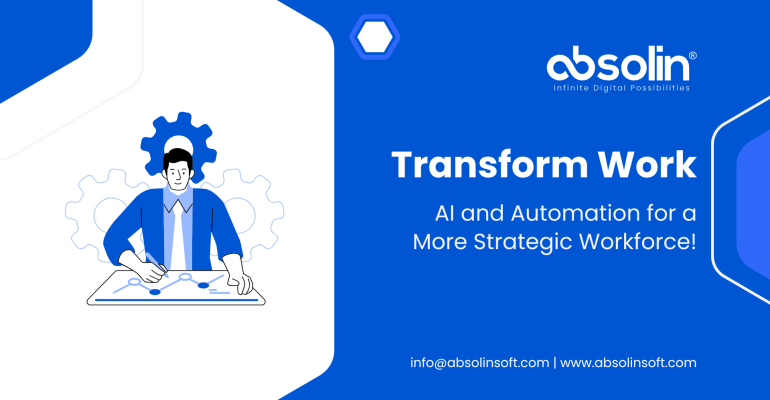From Mundane Tasks to Strategic Work: How AI and Automation Are Redefining Roles

From Mundane Tasks to Strategic Work: How AI and Automation Are Redefining Roles
The rapid rise of artificial intelligence (AI) and automation is fundamentally transforming the modern workplace. Once confined to handling repetitive, routine tasks, automation is now advancing into areas that require problem-solving, decision-making, and even creative thinking. This shift is enabling businesses to drive efficiency while freeing up human workers to focus on strategic, high-value work. Here’s a look at how AI and automation are reshaping roles in today’s organizations.
1. Automation of Repetitive Tasks
At its core, AI and automation have always excelled in handling repetitive, mundane tasks that once consumed valuable time and resources. This includes data entry, scheduling, basic customer support, and other rule-based processes. Technologies like robotic process automation (RPA) now enable businesses to automate these tasks quickly and accurately, reducing human error and improving productivity.
- Example: In finance, AI-driven tools automate the process of invoice processing, freeing accounting teams from manual paperwork and allowing them to focus on financial planning and analysis.
2. Shift Toward Strategic Thinking
As automation handles more routine work, employees can shift their attention to strategic tasks that require human intuition, creativity, and emotional intelligence. This reallocation allows workers to focus on problem-solving, innovation, and contributing to long-term business goals, rather than being bogged down by repetitive tasks.
- Example: In marketing, automation tools manage email campaigns and social media scheduling, enabling marketers to focus on strategy, campaign design, and understanding customer behavior.
3. Enhanced Decision-Making with AI
AI’s ability to analyze vast amounts of data in real time and provide actionable insights is reshaping decision-making in many industries. AI-driven business intelligence (BI) tools provide predictive analytics that help organizations make data-driven decisions faster and with more confidence. This empowers employees to focus on interpreting the data and using it to inform business strategy.
- Example: Retailers are using AI to predict demand, optimize inventory levels, and analyze customer buying patterns, improving decision-making in supply chain and inventory management.
4. AI as a Creative Partner
Contrary to earlier fears that AI would only handle monotonous tasks, it is now playing an active role in creative fields as well. From generating personalized content recommendations to designing graphics and even composing music, AI is being used as a tool to augment human creativity. Rather than replacing human input, it is becoming a collaborator that enhances the creative process.
- Example: Content creation platforms use AI to assist writers by generating topic ideas, conducting research, or even suggesting edits, helping them produce more compelling and effective content.
5. New Job Roles and Skills Development
As automation takes over traditional tasks, there is a growing need for employees to develop new skill sets. Roles that involve managing, programming, and collaborating with AI and automated systems are becoming increasingly important. Additionally, employees are now being tasked with overseeing ethical considerations, compliance, and governance related to AI.
- Example: Data analysts and AI ethicists are now critical roles in organizations, responsible for managing the ethical implications of AI systems and ensuring that data-driven decisions are aligned with corporate and societal values.
6. Greater Focus on Human-Centric Skills
With machines handling more technical work, the value of human-centric skills such as empathy, leadership, and communication has grown. Workers are now focusing on interpersonal skills that are essential in areas such as customer relationship management, team leadership, and innovation. This has led to a redefinition of roles, particularly in areas like customer service, where the human touch remains indispensable.
- Example: AI chatbots handle routine customer queries, but complex issues still require human intervention to provide personalized support and build meaningful customer relationships.
7. Transformation of Knowledge Work
AI and automation are increasingly being applied to knowledge work—roles that involve handling complex information, such as legal research, medical diagnostics, and financial analysis. AI-driven tools can process and analyze vast amounts of information quickly, enabling professionals in these fields to focus on interpreting results and making higher-level strategic decisions.
- Example: In the healthcare industry, AI assists doctors in diagnosing diseases by analyzing medical images and patient records, allowing medical professionals to make quicker, more accurate diagnoses.
Conclusion
AI and automation are not simply replacing jobs; they are transforming how we work by allowing employees to move from repetitive, mundane tasks to more strategic, creative, and human-centered roles. As these technologies continue to advance, businesses will need to adapt by redefining job roles, upskilling their workforce, and embracing the opportunities that come with AI-driven transformation. Ultimately, the integration of AI and automation promises to enhance productivity while fostering greater innovation and strategic thinking in the workplace.





